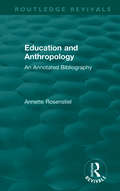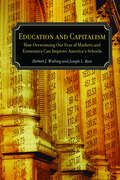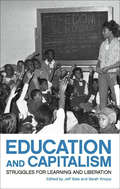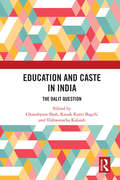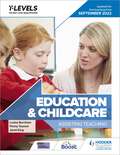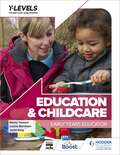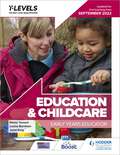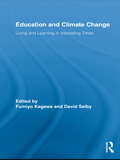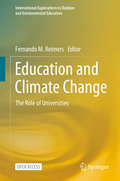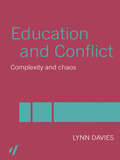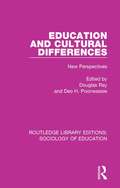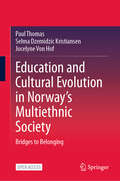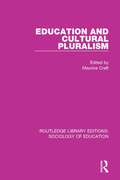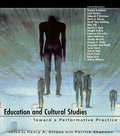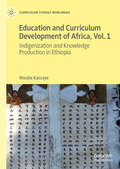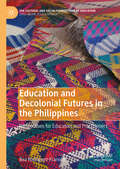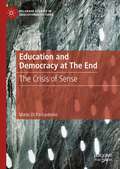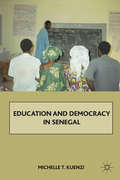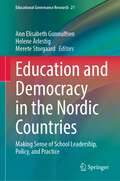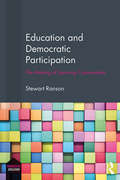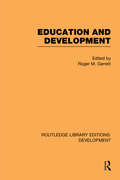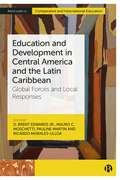- Table View
- List View
Education and Anthropology: An Annotated Bibliography (Routledge Revivals)
by Annette RosenstielOriginally published in 1977 and compiled over a period of 25 years of teaching and research in the fields of education and anthropology, this annotated bibliography was designed as a single source reflecting (1) historical influences (2) current trends (3) theoretical concerns and (4) practical methodology at the interfaces of these disciplines. All entries, listed alphabetically by author, are numbered for ready reference, and the material covered spans nearly three centuries, from the earliest entry in 1689 to the most recent in 1976. The volume also contains entries for items dealing with the teaching of anthropology and the use of anthropological concepts and data in teaching.
Education and Capitalism: How Overcoming Our Fear of Markets and Economics Can Improve
by Herbert J. Walberg Joseph L. BastThe authors call on the need to combine education with capitalism. Drawing on insights and findings from history, psychology, sociology, political science, and economics, they show how, if our schools were moved from the public sector to the private sector, they could once again do a superior job providing K–12 education.
Education and Capitalism: Struggles for Learning and Liberation
by Jeff Bale Sarah KnoppEducators examine the state of public schooling, confront the anti-union stance of policymakers, and offer a bold new direction in this essay anthology.A conservative, bipartisan consensus dominates the discussion about what’s wrong with our schools and how to fix them. It offers “solutions” that scapegoat teachers, vilify unions, and impose a market mentality on education. In Education and Capitalism, teacher-activists expose the damaging limitations of this elite consensus and offer an alternative vision of learning for liberation.Co-editors Sarah Knopp and Jeff Bale presents a powerful defense of public education. Other contributors offer historical analysis of school reform with a focus on civil rights and union-led movements. Arguing that today’s schools are designed to serve the needs of capitalism rather than students, this volume offers an action plan for positive change.
Education and Caste in India: The Dalit Question
by Ghanshyam Shah Kanak Kanti Bagchi Vishwanatha KalaiahSeven decades since Indian Independence, education takes the centre stage in every major discussion on development, especially when we talk about social exclusion, Dalits and reservations today. This book examines social inclusion in the education sector in India for Scheduled Castes (SCs). The volume: · Foregrounds the historical struggles of the SCs to understand why the quest for education is so central to shaping SC consciousness and aspirations; · Works with exhaustive state-level studies with a view to assessing commonalities and differences in the educational status of SCs today; · Takes stock of the policymaking and extent of implementations across Indian states to understand the challenges faced in different scenarios; · Seeks to analyse the differential in existing economic conditions, and other structural constraints, in relation to access to quality educational facilities; · Examines the social perceptions and experiences of SC students as they live now. A major study, the volume will be of great interest to scholars and researchers of education, sociology and social anthropology, development studies and South Asian studies.
Education and Childcare T Level: Assisting Teaching: Updated for first teaching from September 2022
by Penny Tassoni Louise Burnham Janet KingBegin your path to a career in Education and Childcare with this T Level textbook that covers both the core content and the assisting teaching specialism content you will need to understand to be successful in your qualification. For first teaching from September 2022.Develop your understanding of the key principles, concepts, theories and skills that will give you a solid foundation of knowledge to support you during your industry placement.Created in partnership with CACHE and written by highly respected authors Penny Tassoni, Louise Burnham and Janet King, you can feel confident relying on the insights and experience of these experts.- Track and consolidate your learning using the learning outcomes at the beginning of every unit and Test Yourself questions throughout each unit- Ensure you don't miss any important terminology with key terms highlighted and defined in context- Contextualise your learning with case studies, reflection tasks and practice points- Prepare for your examinations with knowledge-based practice questions- Understand how to approach your assignments with practical tasks and model answers
Education and Childcare T Level: Assisting Teaching: Updated for first teaching from September 2022
by Penny Tassoni Louise Burnham Janet KingBegin your path to a career in Education and Childcare with this T Level textbook that covers both the core content and the assisting teaching specialism content you will need to understand to be successful in your qualification. For first teaching from September 2022.Develop your understanding of the key principles, concepts, theories and skills that will give you a solid foundation of knowledge to support you during your industry placement.Created in partnership with CACHE and written by highly respected authors Penny Tassoni, Louise Burnham and Janet King, you can feel confident relying on the insights and experience of these experts.- Track and consolidate your learning using the learning outcomes at the beginning of every unit and Test Yourself questions throughout each unit- Ensure you don't miss any important terminology with key terms highlighted and defined in context- Contextualise your learning with case studies, reflection tasks and practice points- Prepare for your examinations with knowledge-based practice questions- Understand how to approach your assignments with practical tasks and model answers
Education and Childcare T Level: Early Years Educator
by Penny Tassoni Louise Burnham Janet KingBegin your path to a career in Education and Childcare with this T Level textbook that covers both the core content and the education and childcare specialism content you will need to understand to be successful in your qualification.Develop your understanding of the key principles, concepts, theories and skills that will give you a solid foundation of knowledge to support you during your industry placement.Created in partnership with CACHE and written by highly respected authors Penny Tassoni, Louise Burnham and Janet King, you can feel confident relying on the insights and experience of these experts.- Track and consolidate your learning using the learning outcomes at the beginning of every unit and Test Yourself questions throughout each unit- Ensure you don't miss any important terminology with key terms highlighted and defined in context- Contextualise your learning with case studies, reflection tasks and practice points- Prepare for your examinations with knowledge-based practice questions- Understand how to approach your assignments with practical tasks and model answers
Education and Childcare T Level: Early Years Educator
by Penny Tassoni Louise Burnham Janet KingBegin your path to a career in Education and Childcare with this T Level textbook that covers both the core content and the education and childcare specialism content you will need to understand to be successful in your qualification.Develop your understanding of the key principles, concepts, theories and skills that will give you a solid foundation of knowledge to support you during your industry placement.Created in partnership with CACHE and written by highly respected authors Penny Tassoni, Louise Burnham and Janet King, you can feel confident relying on the insights and experience of these experts.- Track and consolidate your learning using the learning outcomes at the beginning of every unit and Test Yourself questions throughout each unit- Ensure you don't miss any important terminology with key terms highlighted and defined in context- Contextualise your learning with case studies, reflection tasks and practice points- Prepare for your examinations with knowledge-based practice questions- Understand how to approach your assignments with practical tasks and model answers
Education and Childcare T Level: Early Years Educator: Updated for first teaching from September 2022
by Penny Tassoni Louise Burnham Janet KingBegin your path to a career in Education and Childcare with this T Level textbook that covers both the core content and the education and childcare specialism content you will need to understand to be successful in your qualification. For first teaching from September 2022.Develop your understanding of the key principles, concepts, theories and skills that will give you a solid foundation of knowledge to support you during your industry placement.Created in partnership with CACHE and written by highly respected authors Penny Tassoni, Louise Burnham and Janet King, you can feel confident relying on the insights and experience of these experts.- Track and consolidate your learning using the learning outcomes at the beginning of every unit and Test Yourself questions throughout each unit- Ensure you don't miss any important terminology with key terms highlighted and defined in context- Contextualise your learning with case studies, reflection tasks and practice points- Prepare for your examinations with knowledge-based practice questions- Understand how to approach your assignments with practical tasks and model answers
Education and Childcare T Level: Early Years Educator: Updated for first teaching from September 2022
by Penny Tassoni Louise Burnham Janet KingBegin your path to a career in Education and Childcare with this T Level textbook that covers both the core content and the education and childcare specialism content you will need to understand to be successful in your qualification. For first teaching from September 2022.Develop your understanding of the key principles, concepts, theories and skills that will give you a solid foundation of knowledge to support you during your industry placement.Created in partnership with CACHE and written by highly respected authors Penny Tassoni, Louise Burnham and Janet King, you can feel confident relying on the insights and experience of these experts.- Track and consolidate your learning using the learning outcomes at the beginning of every unit and Test Yourself questions throughout each unit- Ensure you don't miss any important terminology with key terms highlighted and defined in context- Contextualise your learning with case studies, reflection tasks and practice points- Prepare for your examinations with knowledge-based practice questions- Understand how to approach your assignments with practical tasks and model answers
Education and Climate Change: Living and Learning in Interesting Times (Routledge Research in Education)
by David Selby Fumiyo KagawaThere is widespread consensus in the international scientific community that climate change is happening and that abrupt and irreversible impacts are already set in motion. What part does education have to play in helping alleviate rampant climate change and in mitigating its worst effects? In this volume, contributors review and reflect upon social learning from and within their fields of educational expertise in response to the concerns over climate change. They address the contributions the field is currently making to help preempt and mitigate the environmental and social impacts of climate change, as well as how it will continue to respond to the ever changing climate situation. With a special foreword by Desmond Tutu, Archbishop Emeritus of Cape Town.
Education and Climate Change: The Role of Universities (International Explorations in Outdoor and Environmental Education)
by Fernando M. ReimersThis open access volume draws on a multidimensional model of educational change, the book reviews the field of climate change education and identifies some of the areas in which past efforts have fallen short in supporting effective pedagogical change at scale. It then formulates an approach to engage university students and faculty in partnering with schools and adult education institutions and directly contribute innovative curricula on climate change. The approach is illustrated with several case studies which present curricula developed to support school-based innovation in the Middle East and in Guatemala, and adult education in Haiti and Pakistan, and educators preparation at the university level. The approach followed to develop innovative curriculum follows five steps: 1) What are the specific impacts of climate change in this jurisdiction? How do they impact various human populations? 2) What knowledge, dispositions and behaviors could mitigate the impact of climate change and are there ways in which changes in the behaviors of populations in this jurisdiction could slow down climate change? 3) What are the means of delivery to reach each of the specific populations in this jurisdiction who needs to be educated on climate change? 4) What curriculum can help educate each population? 5) What role can the institution we are collaborating with play in advancing climate change education in that jurisdiction? The various chapters of the book present the conceptual foundation of these programs and illustrate how these programs respond to specific characteristics of local contexts. These programs focus in schools, non-formal settings and educator preparation institutions. The chapters offer examples of general value beyond the specific contexts for which they were designed, as they illustrate how in order to be optimally useful climate change education needs to be firmly grounded in the specifics of a context and responsive to that context.
Education and Conflict: Complexity and Chaos
by Lynn DaviesFirst-place winner of the Society for Education Studies' 2005 book prize, Education and Conflict is a critical review of education in an international context. Based on the author's extensive research and experience of education in several areas afflicted by conflict, the book explores the relationship between schooling and social conflict and looks at conflict internal to schools. It posits a direct link between the ethos of a school and the attitudes of future citizens towards 'others'. It also looks at the nature and purpose of peace education and war education, and addresses the role of gender and masculinity.In five lucid, vigorously argued sections, the author brings this thought-provoking and original piece of work to life by:* Setting out the terms of the debate, defining conflict and peace and outlining the relevant aspects of complexity theory for education* Exploring the sources of conflict and their relations to schooling in terms of gender/masculinity, pluralism, nationalism and identity* Focusing on the direct education/war interface* Examining educational responses to conflict* Highlighting conflict resolution within the school itself.This is the first time that so many aspects of conflict and education have been brought together in one sustained argument. With its crucial exposure of the currently culpable role of formal schooling in maintaining conflict, this book will be a powerful and essential read for educational policy makers, managers, teachers and researchers dealing with conflict in their own contexts.
Education and Cultural Differences: New Perspectives (Routledge Library Editions: Sociology of Education #44)
by Douglas Ray Deo H. PoonwassieFirst published in 1992, this book looks at the interaction between ideals and reality, with the focus upon social inequality and education in modern society, as well as the possibilities for education to lessen the related problems. The essays in this volume examine three forms of inequality in global society: aboriginal societies in modern industrial states; long-established communities that have been denied full status; and differences arising from recent population migrations. In doing so, it considers how education might support the efforts of all members of society to pursue the goal of equal status for all.
Education and Cultural Evolution in Norway’s Multiethnic Society: Bridges to Belonging
by Paul Thomas Selma Dzemidzic Kristiansen Jocelyne Von HofThis open access volume explores the complex dynamics of ethnic and racial segregation in Norwegian schools, particularly in Oslo. It examines how educational institutions can reflect and challenge societal norms regarding race, culture, and identity. The book argues that while Norway pursues an egalitarian ethos, recent trends in school segregation undermine these ideals. The major contribution of this book lies in its critical exploration of the intersectionality of race, culture, and education, grounded in critical pedagogy principles. Through case studies, personal narratives, and literary analyses, the authors highlight how marginalized students navigate their identities within systems that often stigmatize them. Topics include authentic multicultural education, the reclamation of space and identity by non-white students, and the examination of “ghetto schools” as sites of both challenge and empowerment. Special features include visual illustrations and engaging literary analyses. Ultimately this volume serves as a compelling call for educational reform and cultural dialogue, emphasizing the transformative potential of education in promoting social justice and community cohesion.
Education and Cultural Pluralism (Routledge Library Editions: Sociology of Education #16)
by Maurice CraftThis collection of essays, first published in 1984, on multicultural education seeks to introduce teachers, teacher educators, educational administrators, policymakers and others to several of the most significant dimensions of the field. But it also brings out the complexity of the issues and the dangers of over-simplification, the inadequacies of much of the available data, and the need for better long-term strategies.
Education and Cultural Studies: Toward a Performative Practice (Critical Studies In Education And Culture Ser.critical Studies In Education)
by Henry A. Giroux Patrick ShannonFirst Published in 1998. Routledge is an imprint of Taylor & Francis, an informa company.
Education and Curriculum Development of Africa Vol. 1: Indigenization and Knowledge Production in Ethiopia (Curriculum Studies Worldwide)
by Woube KassayeThis book, the first of two volumes, focuses on the conceptualization of Indigenous Knowledge and Curriculum, Ethiopian/African Philosophy and the possibilities of Indigenization/Africanization of African Education. Its main purpose is to overview the practices of traditional/indigenous education of Africa with emphasis on Ethiopia’s experience connected with curriculum development, and make possible suggestions that could contribute to curriculum development endeavors of Africa. The cultural heritage of the majority African countries is either ignored or not adequately considered in the formulation of educational policies and curricula in their modern African educational systems. Hence, a new path and paradigm shift are needed. To this end, considering Africa's outstanding IK with useful experiences of other countries in education particularly in the curriculum is critical to bring the required change.
Education and Decolonial Futures in the Philippines: Perspectives for Educators and Practitioners (The Cultural and Social Foundations of Education)
by Bea Rodriguez-FransenThis book is a unique and provocative study that weaves personal and historical narratives, diverse theoretical frameworks, and futures thinking. Using critical bricolage methodology and the Indigenous method of pakikipagkuwentuhan (storytelling), Rodriguez-Fransen amplifies the voices of Filipina educators as they interrogate and re-conceptualize colonial mentality as a systemic rather than an individual problem, and bridges the gap between educational theory and practice by creating new teaching and research tools, for scholars and practitioners in various sectors around the world: the Decolonial Portals and Decolonial Design Futures frameworks. This book takes readers on a journey through time, highlighting the interconnectedness and fluidity of past, present, and future stories of our world; it encourages all of us to recognize colonial mentality as a global problem, and calls for transdisciplinary, cross-sector, and cross-country collaborations in order to decolonize education and our futures.
Education and Democracy at The End: The Crisis of Sense (Palgrave Studies in Educational Futures)
by Mario Di PaolantonioThis book grapples with what it means when education and democracy are at an end: when these two foundational aspects of our society seem to have reached a culminating point, no longer appearing to produce and make sense amid the crises of our time. Engaging topical political events and mobilizing a variety of cultural resources, Di Paolantonio shows that today the possibility of the future and the significance of an expansive transgenerational sensibility are radically in question as trends toward destruction, cruelty, and banality are steering world-defying calamities, and sparking “chronopathologies” of doom and despair among the planet’s occupants. Unfolding his argument through a series of accessible chapters that draw on contemporary philosophy, educational thinking, and cultural-artistic works, Di Paolantonio explores how the transgenerational sensibility retains a possibility we might tap for overcoming the impasses of our time.
Education and Democracy in Senegal
by Michelle T. KuenziThis book examines the role of non-formal education (NFE) in promoting democracy in Senegal.
Education and Democracy in the Nordic Countries: Making Sense of School Leadership, Policy, and Practice (Educational Governance Research #21)
by Helene Ärlestig Ann Elisabeth Gunnulfsen Merete StorgaardThis book discusses principals’ prerequisites and work within the five Nordic countries and focuses on schools as formal institutions that carry out functions delegated to them by the social collective. It includes a discussion about what kind of state policy demonstrates autonomy in Nordic schools, as well as the ways in which school leaders as sense makers in local schools possess and enact policy in a globalized economy and a changing world. The book draws both on a range of theoretical frameworks and educational leadership and policy research to provide multiple comparative perspectives of school leadership in the Nordic countries, the moral purpose of schooling, school governance and power relations, expectations towards school leadership, handling of crises, and cultures of trust. The chapters range from in depth-case studies and policy document analyses to large-scale data sets and literature reviews. All chapters have multiple messages for practitioners, policy makers and researchers as they seek to engage with school leadership as a core activity in times of societal changes. As democratic welfare states, the five Nordic countries have many similarities, but also differences which makes it interesting to understand more about various ways to strive towards democracy and well-educated citizens.
Education and Democratic Participation: The Making of Learning Communities (Progressive Education)
by Stewart RansonEducation and Democratic Participation is an important and timely contribution to the emerging debate surrounding the value of educating citizens and communities in order to empower them to participate in democratic change. Responding to the effects of neo-liberal ideology on comprehensive education and public services, this book examines the purposes and conditions for reimagining an educated democracy. Arguing that social divisions and cultural misrecognition have intensified to the point of crisis, Ranson explains that a just society must create opportunities for diverse, cohesive and tolerant neighbourhoods to flourish. In order to achieve this, education will need to reimagine learners as prospective citizens and as cooperative makers of the democratic communities in which they live and work. Showing that participation in public forums, councils and associations can provide a real means of enabling members of different communities to learn how to respect and value one another, this book provides persuasive arguments that a broader pedagogy of democracy is needed to confront the common dilemmas facing society. This work is aimed at researchers, academics and postgraduates, particularly those lecturing and studying in the areas of education, the social sciences and politics. It will also appeal to professional and practitioner communities in school and college teaching, as well as in local authorities and related public services.
Education and Development (Routledge Library Editions: Development)
by Roger M. GarrettFirst published in 1984, this collection represents the combined contributions to an international conference held at the University of Bristol in April 1983. In assessing the complex relationship between education and development, it covers a wide range of countries in its appraisal and presents pictures both of optimism and pessimism. All, however, encourage the reader to re-examine long-held beliefs, and presents a new starting point for fresh discussion of this vital subject.
Education and Development in Central America and the Latin Caribbean: Global Forces and Local Responses
by D. Brent Edwards Jr., Mauro C. Moschetti, Pauline Martin, and Ricardo Morales-UlloaRooted in an international political economy theoretical framework, this book provides unique insights into the global forces and local responses that are shaping education systems in Central America and the Latin Caribbean (CALC). The book covers all Spanish-speaking countries of the CALC region and examines the effects of macro-economic pressures, geopolitical intervention, neo-colonial relationships, global pandemics, transnational gang networks, and the influence of international organizations. Chapters analyse the challenges and opportunities these global forces present to education systems in the region as well as highlighting the local efforts to address, mitigate, and counteract them. In doing so, the book illuminates how education can contribute to either maintaining or challenging inequalities and exclusion in the face of pressures from the global to local levels.
